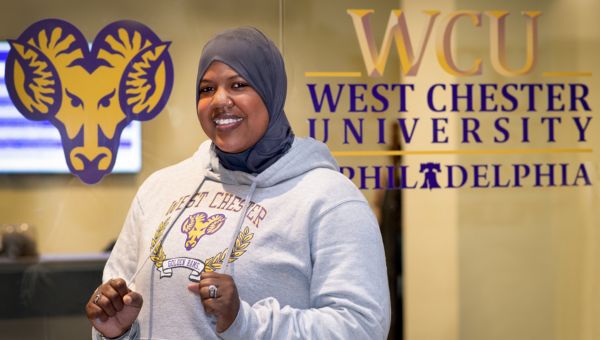Graduating West Chester University Senior Already Using Degree to Empower Young Women

The U.S. Department of Labor called social work one of the fastest growing careers in the country. According to its Bureau of Labor Statistics, there were more than 700,000 social work jobs in 2021, and the profession is expected to grow by nine percent by 2031.
One area of growth within social work will be addressing the needs of children and teens. A recent TIME magazine article reported that nearly three in five American teen girls said they felt sad or hopeless in 2021, “the highest level seen in a decade and nearly twice the rate among teenage boys.”
At a time when self-harm among youth is on the rise, West Chester University is preparing its students for careers in social work. One of those students, Edwena Lanier, a senior social work major at WCU’s Philadelphia location, is already empowering teen girls.
Working at a Philadelphia charter school in 2011, Lanier saw firsthand that many of the school’s girls were in dire need of a supportive, structured environment to turn to after school. Most of the afterschool activities were geared toward boys, so Lanier founded Girls Talk, a safe space for girls to come together and talk about anything and everything.
Lanier knew she had done the right thing as the girls in her group began to unpack their worries, which ranged from school issues and homelife anxieties to losing a loved one to gun violence. Eager to continue this work, Lanier tried to find ways to move up but found doors closed to her. She had a high school diploma but, despite her many accomplishments inside and outside of school, she knew she’d need to pursue higher education to take Girls Talk to the next level.
“I realized I had to return to school,” she said. “I knew I was going to keep hearing ‘no,’ no matter how good I was. I didn’t have a degree.”
She earned an associate degree from a community college, and then transferred to West Chester University as a social work major. She’ll complete her bachelor’s degree this May, and then return for her master’s degree. Her course work has already impacted Girls Talk.
One such class was General Social Work Practice with Professor Michele Belliveau.
“We talked about different theories and skills of social work, and the power of one,” Lanier said. “For example, highlighting motivational interviewing. So, when you’re talking to the client – the member of Girls Talk – focusing on helping them feel empowered by helping themselves. Motivational interviewing helps them highlight that one thing that went well and using that to overcome hardship.”
While studying at WCU, Lanier and her daughter, Aleemah, wrote a book, “Let’s Help the Bully.” The book is part of a larger bullying campaign and was partially inspired by her classwork.
“The courses I was taking in social work helped me to advocate for anti-bullying,” she said. “A lot of macro work in social work deals with advocacy and being a voice for the many who are voiceless, which is something I learned a great day from in Professor Ebbonie Vazquez’s policy course.”
Many of Lanier’s professors made themselves available to her to brainstorm the book or review ideas. She is grateful for their support and enthusiasm. It’s what drew her to WCU in the first place – that and the flexibility to complete her courses while simultaneously working a full-time job (she’s now working in human resources at the charter school), managing Girls Talk, and being a wife and mother.
“I’m proud to have gone and faced all of my fears and doubts that I had about returning to school after almost 20 years,” she said. “I don’t know where things would be without me returning to school. I’m elated that I did.”
Lanier said her work through Girls Talk has shown her there is a great need for social workers.
She recalled a Girls Talk session where she asked her students to put their heads down and raise a thumb if they knew someone who had been murdered in the last two years. Dozens of them did.
“It’s overwhelming. Many of them are affected – so many of them know peers who have been murdered. Some are numb to it because they see it so much,” she said. “Having a program like mine or just having more social workers can only be a benefit to the youth.”
